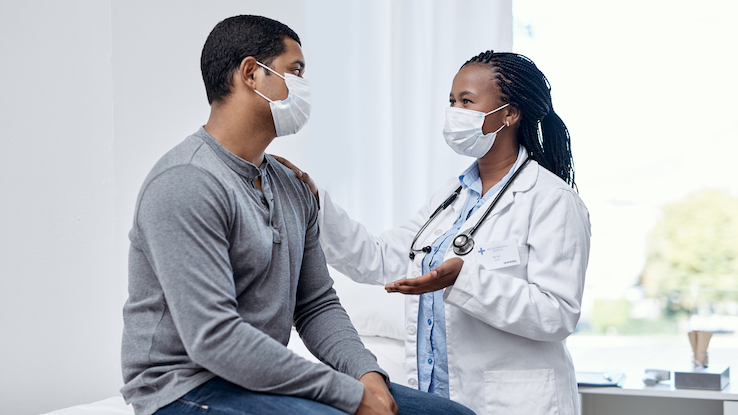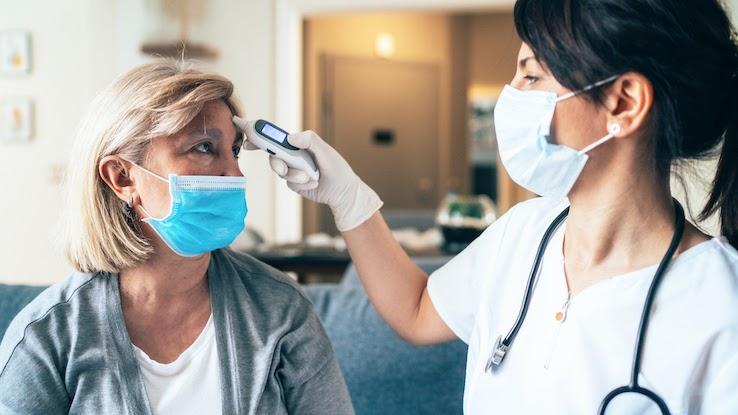COVID-19: Prevention, Symptoms and Treatments

COVID-19 is a disease caused by a virus called severe acute respiratory syndrome coronavirus 2 (SARS-CoV-2). Experts identified the first cases in late 2019, and the World Health Organization declared COVID-19 a global pandemic in March 2020.
This novel (new) coronavirus belongs to the same family of viruses as the one that causes the common cold. Coronaviruses get their name from the Latin word “corona,” which means “crown.” This is because of the crown-shaped spike proteins on the surface of the virus.
The COVID-19 pandemic has had an immense impact on the entire world. Millions of people have died, and millions more are living with lingering health effects of the disease. Fortunately, the scientific community was able to mobilize quickly and develop safe, effective vaccines to help stop the spread of COVID-19. But it’s still important to take prevention steps and be aware of the symptoms and risk factors for the virus.
What Are the Symptoms of COVID-19?

Symptoms of COVID-19 can vary from person to person. Some people get very sick, while some have only mild symptoms or no symptoms at all. If you have the virus but you don’t have any symptoms, you’re “asymptomatic” — but you can still spread it to other people.
Symptoms may take anywhere from two to 14 days to appear. This means that you might not notice symptoms for two weeks, but you may still spread the virus to other people during that time.
Common COVID-19 symptoms include:
- Fever or chills
- Coughing
- Shortness of breath or trouble breathing
- Fatigue (feeling very tired)
- Loss of taste or smell
- Headache or body aches
- Nasal congestion or runny nose
- Sore throat
- Nausea, vomiting or diarrhea
Although most people have only mild to moderate COVID-19 symptoms, it can also cause severe complications and even death. Severe complications include:
- Pneumonia and acute respiratory distress syndrome (ARDS)
- Heart and kidney problems
- Blood clots
- Organ failure
I Have Symptoms of COVID-19. What Should I Do?
Most people have mild to moderate symptoms and can recover at home. If you have mild COVID-19 symptoms, similar to a cold or flu, take these steps:
- Stay home and away from other people for at least five days from when your symptoms first started. If you live with other people, try to separate yourself from them as much as possible. Stay in a separate room and wear a mask when you’re near other people. Only leave your home to get medical care or to get tested.
- Get tested. You can get at-home tests online or over the counter from your local pharmacy. They’re easy to use and provide rapid results, and testing at home can limit the number of people you come in contact with. If you test positive, continue to isolate at home for at least five days from when your symptoms first started.
- Tell your close contacts. If you were around other people in the two days before your symptoms started, let them know that you’re sick. That way, they can get tested and avoid spreading the virus to others.
- Care for yourself by resting, drinking plenty of fluids and using over-the-counter medicines (like Advil or Tylenol) as needed.
- Talk with your doctor about any symptoms you’re concerned about and keep track of how you’re feeling day to day. Always call ahead before visiting the doctor. You may be able to do a telehealth visit instead.
If you or someone else has any of the following emergency symptoms, get help right away:
- Trouble breathing
- Pain or pressure in your chest that doesn’t go away
- Confusion (new mental confusion that’s not normal for you)
- Inability to wake up or to stay awake
- Pale, gray or blue coloring on your skin, lips or nail beds (color will depend on your skin tone)
These are signs of a medical emergency. Call 911 or go to the nearest emergency room right away.
Am I At Higher Risk for Severe COVID-19?
Anyone can get sick from COVID-19 — even healthy children and young adults. But it’s more likely to cause severe illness in older adults and people with underlying health conditions, including:
- Asthma or other chronic lung conditions
- Cancer
- Dementia or other nervous system conditions
- Diabetes
- Heart, liver or kidney conditions
- HIV or other immune system problems
- Sickle cell disease or thalassemia
- Tuberculosis
You’re also at higher risk of getting seriously ill from Covid-19 if you:
- Are pregnant
- Are overweight or have obesity
- Smoke or used to smoke
- Have had an organ transplant
- Have a mental health or substance use condition
If you or someone you live with is at higher risk for COVID-19, it’s important to take steps to avoid getting infected — like getting vaccinated and wearing masks when you’re out in public.
How Do People Get COVID-19?
COVID-19 is highly contagious — it spreads very easily from person to person. The virus mainly spreads through the air.
When someone with COVID-19 breathes, talks, coughs or sneezes, they release virus into the air on tiny droplets or even tinier aerosol particles. You can get infected if you breathe in these droplets and particles — or if they land in your eyes, nose or mouth.
Droplets settle out of the air fairly quickly, but aerosol particles can stay in the air for hours. That’s why COVID-19 spreads very easily in indoor spaces without good ventilation. You can also get COVID-19 if you touch a surface with virus droplets on it, and then touch your eyes, nose or mouth.
How Can I Protect Myself and Others from COVID-19?
The best way to protect yourself and other people is to get vaccinated.
COVID-19 vaccines have been scientifically proven to be safe and effective and the real-world results also provide additional evidence of their effectiveness. Vaccinated people have a much lower chance of getting COVID-19 — and if you do get sick after getting vaccinated, you’re much less likely to get severely ill or to die. Vaccines also make it less likely that you’ll spread the virus to other people.
Vaccines are currently available for all adults and for children ages five and older. Vaccines for children younger than five are currently in development. The Food and Drug Administration (FDA) has authorized three COVID-19 vaccines for use in the United States: Pfizer, Moderna and Johnson & Johnson. Experts recommend that people get either the Pfizer or Moderna vaccine as a first choice, if they’re available.
Both the Pfizer and Moderna vaccines need two doses, several months apart. You’ll also need a booster dose six months later to keep your immunity as strong as possible. Experts may recommend more booster doses as new COVID-19 variants spread, but the current vaccines still provide very good protection from the worst effects of the disease.
You can also take these steps to protect yourself and those around you:
- Wear a mask that covers your nose and mouth in indoor public spaces.
- Avoid crowds and public indoor spaces without good ventilation.
- Get tested or use at-home tests to avoid spreading the virus to others.
- Wash your hands regularly with soap and water.
How Is COVID-19 Diagnosed?

If you have symptoms of COVID-19 or you’ve been in close contact with someone who has tested positive, you’ll need a test to find out if you have the virus. There are two main types of tests for COVID-19:
- Molecular tests — these tests look for the genetic material of the virus. They’re very accurate, but they often need to be processed by a lab, and results can take several days. The most common type is a polymerase chain reaction (PCR) test.
- Rapid antigen tests — these tests look for specific viral proteins. They’re not as accurate as PCR tests, but they’re quick and easy to do with at-home testing kits.
Both types of test use a nose or throat swab or a saliva sample. You can get both kinds at many locations, including a doctor’s office, pharmacy or a community testing site. You can also get at-home testing kits online or over the counter at pharmacies.
What Are the Treatments for COVID-19?
Most people have only mild illness and recover from COVID-19 without needing any treatment. If you have mild symptoms, you can try over-the-counter medicines like fever reducers and cough syrups. Even with mild symptoms, it’s still very important to get plenty of rest and to stay hydrated — and to stay away from other people so you don’t get them sick.
People with severe COVID-19 may need to stay in the hospital and get supplemental oxygen or even a ventilator to help them breathe. Doctors may also use steroids and other medicines to treat severe COVID-19 symptoms — but there’s currently no cure and few effective treatments for COVID-19.
So far, the FDA has only fully approved one drug to treat COVID-19: the antiviral drug remdesivir. The FDA has also allowed doctors to use several other treatments under an Emergency Use Authorization. These include:
- Monoclonal antibody therapies that can help the immune system respond to COVID-19
- Paxlovid and molnupiravir, two types of antiviral pills
Researchers are working to develop more effective treatments for COVID-19. In the meantime, the best way to protect yourself and others is to get vaccinated and wear masks in indoor public spaces.
Your Next Steps

Remember, the first step in protecting yourself and others from COVID-19 is to get vaccinated right away. If you’re not vaccinated yet, use this tool to find a vaccine appointment near you.
Wearing your mask in indoor public spaces is also key to stopping the spread of the virus. Masks help protect you and make it less likely that you’ll spread the virus to others. And keep on washing your hands and avoiding crowded spaces.
And if you think you may have COVID-19, talk with your doctor about your symptoms — and stay away from other people to avoid spreading the virus.
Resource Links:
- “How to Protect Yourself & Others” via Centers for Disease Control and Prevention (CDC)
- “Symptoms of COVID-19” via CDC
- “What to Do If You Are Sick” via CDC
- “Quarantine and Isolation” via CDC
- “Coronavirus Disease 2019 Testing Basics” via Food and Drug Administration
- “Coronavirus (COVID-19) Dashboard” via World Health Organization





